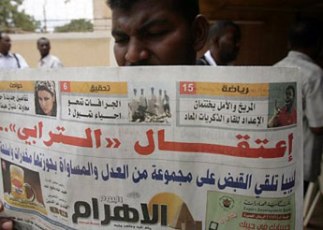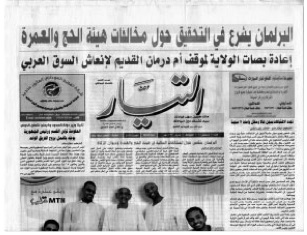Sudan suspends daily on charges of undermining national security
February 22, 2012 (KHARTOUM) – Sudanese security authorities on Tuesday ordered the suspension of a daily newspaper pending investigations into charges of jeopardising national security, in the latest assault on freedom of press in the country.
 The director-general of Sudan’s National Intelligence and Security Services (NISS), Mohamed Atta, issued the resolution which suspended the publication of the daily newspaper Al-Tayyar.
The director-general of Sudan’s National Intelligence and Security Services (NISS), Mohamed Atta, issued the resolution which suspended the publication of the daily newspaper Al-Tayyar.
Quoted by the Sudanese Media Center, a website affiliated to security apparatus, the head of the NISS’s media department said that the decision was predicated on articles 24 and 25 of the National Security Forces Act, which allows the NISS to suspend any publication that “exposes national security to danger.”

Al-Tayyar had its copies confiscated on Monday this week after it defied orders by the NISS not to publish allegations by Sudan’s Islamist opposition leader Hassan Al-Turabi that the NISS bugged his office.
In the weeks preceding its suspension, the title had published a series of investigative articles on alleged corruption within Sudan’s National Cotton Corporation (NCC). The allegations draw a comment from Sudan’s President Omer Al-Bashir who said in a televised interview last month that the documents allegedly implicating the NCC in corruption had reached him and he ordered the department of economic security to initiate an investigation into the matter.
Al-Bashir said that the government will show no leniency on corruption as long as it is evidenced by documents.
However, the reason why the paper has been suspended is believed to be the publishing of a commentary accusing Al-Bashir himself of corruption.
The said commentary, written by a retired university professor, Mohamed Zain Al Abdeen, spoke of Al-Bashir’s alleged condoning of corruption by allowing officials who were embroiled in corruption scandals to face no accountability.
Furthermore, the bold commentary accused Al-Bashir and his family of amassing properties and asked how come an army general like Al-Bashir was able to own so much.
The writer also warned Al-Bashir that his control of the army will not protect him from popular uprisings. This particular warning appears to have given the NISS the pretext it needed to shut down the paper.
In his defense of the decision to suspend Al-Tayyar, the head of the NISS’s media department referred to “the necessity of protecting national security and the integrity of armed and regular forces by not allowing them to be dragged to the square of accusations or be stabbed in the back due to the complicated security situation Sudan is experiencing.”
The security official explained that the NISS’s legal department had already instigated legal proceedings against the paper, adding that its suspension will remain in place until such time that these legal proceedings are ruled upon.
He stressed that the suspension of Al-Tayyar is not a setback in the country’s “atmosphere of freedom” but rather an invitation to exercise responsible press freedom away from abusive rhetoric that go against the ethics of the profession and the “journalistic code of honor”.
The term journalistic code of honor refers to an agreement signed in 2009 between chief editors of Sudanese newspapers and the NISS in exchange for lifting the system of pre-publication censorship whereby NISS agents used to visit offices of newspapers at night and expunge contents deemed sensitive.
The agreement obliges the editors to exercise “self-censorship” and refrain from publishing any content that harms the state or national security.
For its part, Al-Tayyar newspaper issued a statement regretting the NISS decision and describing it as “oppressive.”
The paper said the decision was not a surprise in view of the paper’s extensive coverage of corruption. Al-Tayyar’s editorial team vowed to hold a sit-in inside the paper’s offices to protest the NISS decision.
Sudan’s constitution guarantees freedom of expression but laws subordinate to the constitution such as the National Security Forces Act of 2010 contains articles that can be potentially used to curtail press freedom and instigate legal proceedings against newspapers and individual journalists.
(ST)
